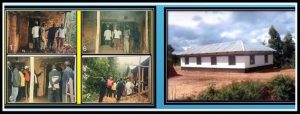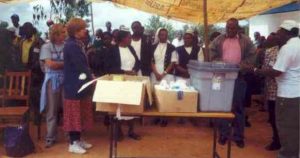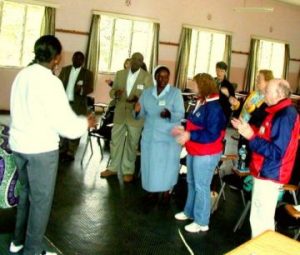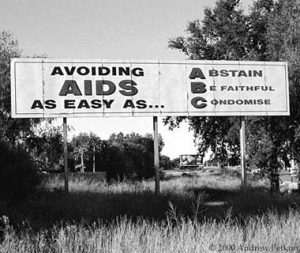COMMUNITY HEALTH:
KITUIUNI HEALTH CENTER PROGRAM:
(Historical Background)KUSARD is profoundly indebted to our partners who have helped in the completion of the Kituiuni Health Center. The  people of Kituiuni have, for many years suffered due to lack of health services in this remote rural area. The nearest Center is miles away and there is no transportation available in case of emergencies and people have to walk long distances to obtain medical services, meanwhile their condition often worsening by the time they are seen by a health medic. Recognizing the severity of the problem, especially in regard to children, the elderly, pregnant mothers and the sick, the founder of KENYA/USA CHRISTIAN RELIEF & DEVELOPMENT, INC (KUSARD), in partnership with the local community and donors in the U.S.A build this clinic which would save the Kituiuni community, in Makueni County in Kenya, years of suffering for luck of medical facilities.
people of Kituiuni have, for many years suffered due to lack of health services in this remote rural area. The nearest Center is miles away and there is no transportation available in case of emergencies and people have to walk long distances to obtain medical services, meanwhile their condition often worsening by the time they are seen by a health medic. Recognizing the severity of the problem, especially in regard to children, the elderly, pregnant mothers and the sick, the founder of KENYA/USA CHRISTIAN RELIEF & DEVELOPMENT, INC (KUSARD), in partnership with the local community and donors in the U.S.A build this clinic which would save the Kituiuni community, in Makueni County in Kenya, years of suffering for luck of medical facilities.
Today, thanks to our sympathetic friends overseas, and the dedication of the Kituiuni Community, buttressed to its hilt, by KUSARD and it’s unrelenting efforts, the dream of a health center materialized when on April 2002 the Kituiuni-Mbuini Health facility was opened by the then sitting Kaiti Constituent Member of Parliament, one Hon. Minister Gideon Ndambuki.
Contributors towards this project included:-
Parishioners of St. Therese Paterson
The Seekers Church of Washington
The Catholic Charities Paterson Chapter
The Rotary Club of Paterson
The Presbyterian Church of Wayne
The Development Finance International- Washington
World Fuels Services Corporation
But although the clinic is now complete, the desired full medical services have not started as had been hoped for. However, some volunteer social workers keep the center open and running. They distribute donated non-prescription drugs and the day is yet to dawn when the clinic will be fully functional. To this end the fight continues through all possible channels and especially through the legislative representative of the area who had opened the clinic after completion, Hon. Ndambuki. It is my conviction that the time is not far off when mothers will have their babies delivered here, while, in and out patients will get the medical care they deserve. The clamor of the people grows louder each day due to their woes and I believe that one day, the government will pay heed to these long suffering rural dwellers of Kituiuni/Kithangathini and take some action. The community has done all it can do, and now it is incubent upon the government and donor community to come to its rescue, and provide staff, equipment and drugs for the center.
 March 18th 2004 Free Clinic A glimpse of the acute need for health services in Kituiuni was demonstrated by an event that took place on March 18th 2004 when a free clinic was held there. It was a two day event and people came in droves to take advantage of the widely publicized free medical services. Visitors from the Wayne Presbyterian Church in USA, in collaboration with the Catholic Mission Hospital of Kilungu delivered free medical services to hundreds of people.
March 18th 2004 Free Clinic A glimpse of the acute need for health services in Kituiuni was demonstrated by an event that took place on March 18th 2004 when a free clinic was held there. It was a two day event and people came in droves to take advantage of the widely publicized free medical services. Visitors from the Wayne Presbyterian Church in USA, in collaboration with the Catholic Mission Hospital of Kilungu delivered free medical services to hundreds of people.
Patients are seen here waiting in line for the opportunity to be treated. Altogether almost 1,000 patients were served during the two days of free medicine; and despite all efforts, hundreds more could still not be served and had to be turned away owing to the high turnout. HIV tests were contacted on site with the aid of a portable power generator which assisted in operating the testing equipment. Like many parts in Africa, the area has had its share of the AIDS scourge and KUSARD is fighting tooth and nail to win the war, although some of it is being lost as we continue to experience an inordinate number of loss of life in this and many other communities in the country. The impact is mostly on members of the most productive age group most of whom have children who are left without one or both parents. The burden of catering for those children falls on other relatives or neighbors. KUSARD is struggling to do what it can but its accomplishments are limited by lack of resources.
Peter Kimeu, KUSARD’s National Advisory, tried to sum up the state of affairs when he said,”The KUSARD organization has been up against an uphill battle in its inability to support those infected and affected by the HIV/AIDS disease. In our meagre efforts KUSARD has supported community based initiatives in responding to the unceasing demand associated with the HIV/AIDS. CIPACAM (The Mwanyambevo AIDS campaign Group); KYAP(The Kituiuni AIDS Awareness Creation Group); 4KClub (The Kyakitoo Group) are KUSARD’s arms in confronting head-on, the crisis posed by the AIDS disease.
KUSARD uses these groups to educate communities on the management of HIV/AIDS in home based care. The fight is very far from being won. We continue to lose those who are positive due to the unavailability of medical supplies; test equipment and support mechanisms.
 We are collectively thankful of last year’s delegation from the Paterson Diocese and the Wayne Presbyterian Church New Jersey to Machakos Diocese. If it had not been for their help, one HIV positive lady and her child would be no longer with us today. But after receiving some assistance from this group plus additional funds from the diocese of Machakos and from KUSARD, she received medical services at the General Hospital in Machakos until she was well enough to return to her village at Mwanyambevo where she continues with her therapies and has joined the local AIDS campaign Groups to help spread the message of avoiding contraction of the AIDS disease.
We are collectively thankful of last year’s delegation from the Paterson Diocese and the Wayne Presbyterian Church New Jersey to Machakos Diocese. If it had not been for their help, one HIV positive lady and her child would be no longer with us today. But after receiving some assistance from this group plus additional funds from the diocese of Machakos and from KUSARD, she received medical services at the General Hospital in Machakos until she was well enough to return to her village at Mwanyambevo where she continues with her therapies and has joined the local AIDS campaign Groups to help spread the message of avoiding contraction of the AIDS disease.
But this lady’s upkeep is beyond her means,”continues Peter,”The cost of managing her condition is substantial since she has no income to speak of. She requires Kshs.500 ($10.00) monthly for medical supplies. Constant monthly laboratory examinations costing Ksh. 1,300 ($20.00) per month. A good diet of high protein, vegetable and fruits. Obviously this is a toll order which she will certainly not be able to fill and it will be impossible for her to keep up with the requirements to keep her alive for lack of resources. This cost does not even take into account the baby who has not yet been tested for the disease although it was given preventive medicine at birth and cannot be breast fed by the mother. The loan of Kshs 10,000/= ($150.00) given her as a loan for income generation has all but disappeared thanks to the adverse and unfavorable economic conditions in Kenya.
We surely need support, not only to help this woman and her baby, but also engage the community in awareness creation to fully understand the need for prevention and also to try and mainstream the disease to remove the stigma associated with it and make it accepted as any other disease, although to be dreaded and avoided. This will help in accepting the sick among us and to care for them and to encourage all at risk to get tested to be sure of their status, in order to prevent the snowballing of the crisis. An estimate of about Kshs. 5,000 – 10,000 ($72.00-150.00) per month for each positive case and family support is needed. But most people in the communities we serve make about Kshs.1,000 to 2,000 per month. ie. $14 to $28 per month” and when they become infected they lose even that little income if it was there in the first place.” Concluded Peter.
RETURN TO HOMEPAGE OR CONTINUE TO PHASE II OF THE WATER PROJECT
WAR AGAINST THE AIDS SCOURGE:
KUSARD’S HIV AND AIDS PROGRAM
 AIDS is one of the greatest health problems of this century. The stigma associated with it has made it become almost a secretive disease which often ravages victims in silence until it can no longer remain hidden and then when one dies of it, it is always from some other type of disease so that the family does not suffer the indignity of having a relative die of this dreadful disease. Often people hide their status and in this situation the potential to spread the disease is very real.
AIDS is one of the greatest health problems of this century. The stigma associated with it has made it become almost a secretive disease which often ravages victims in silence until it can no longer remain hidden and then when one dies of it, it is always from some other type of disease so that the family does not suffer the indignity of having a relative die of this dreadful disease. Often people hide their status and in this situation the potential to spread the disease is very real.
In 25 years, HIV has infected more than 65 million people. The majority of those suffering live in Africa, but the pandemic is quickly spreading in many countries throughout Eastern Europe, Latin America and Asia. By 2010, it is estimated that 80 million people will be infected and 25 million children will have been orphaned. HIV and AIDS disproportionately affect the poor and vulnerable and limited resources often prevent poor communities from supporting the millions who suffer.
The scope of the spread of the disease should not be a discouragement in doing whatever can be done in any capacity to stave off this disease. Recognizing this need, KUSARD, in its own small way started a program which was mostly contacted by the youth with KUSARD’s support. Their aim was to spread the message to their peers about this disease and to discourage risky behavior that can lead to someone contracting the disease. Behavioral change was key to staving off the tide.
We have to main arms of dealing with the pandemic. The CIPAM (Community Integrated AIDS Campaign and KYAP (Kituiuni Youth AIDS Program). Different methods of passing the message to those most at risk are applied. Drama; Videos; Guest Speakers (often AIDS victims); and any other way that resonates with the youth that can encourage the message to be heard and understood and practiced. Testing and Counseling is another way in which we encourage those at risk to participate in; first to determine their status and also to prevent further spreading of the diseases to friends even relatives like in the case of married people .
KUSARD helps individuals, families and communities as they struggle through the physical, economic, social and emotional ravages of the disease. By working with local and international partners – including Churches, local authorities, and other faith-based and private organizations – we empower people and communities to stem the tide of the pandemic.
ADDENDUM:- We name Community Health as one of our success stories because of the struggle from when KUSARD conceived of the idea to bring medicine closer to the residents of this enclave of Kituiuni. We wanted to utilize a piece of land we had bought years back with the same vision but the thought had been shelved for monetary reasons until KUSARD decided to revitalize it and pursue with a new zeal original vision to build a health center there even though the resources to do so were still not there. But now with a new approach KUSARD was ready re-start the stalled initiative. By mobilizing the community and trying to partner with local and international bodies, we eventually managed to construct the center but again we were faced with the reality of having a white elephant in our hands since although the building was there, we had no medicines and no personnel, for again, the same old problem beset us; – we were cash-strapped, and could not afford any of these services. However, approaching the Diocese of Machakos, Social Services and seeking their partnership, we were able to have some ladies from our village trained in administering basic medicines for common ailments like colds etc and in addition we entered into an agreement with the Sister in charge of the Kikoko Catholic Cottage Hospital to once week operate a mobile clinic at the Health Center.
All these things were done in an attempt to keep the Project operational even at a most basic level.
To make a long story short, this struggle lasted for years and our greatest breakthrough came about after the Kenya devolution when the Country attained a type of Federal Government with self governing counties by delegating government authority to the County and local level and in so doing bringing the government within the reach of the local people. This was our greatest breakthrough as our activities and efforts were now visible and recognizable whereas in the time of big government, we were lost in the large picture.
At this juncture it was easier to reach out to the County Government who in turn evaluated the Project and deemed it worthy of their consideration and from thereon nothing was the same. A huge weight was lifted off our shoulders as, to our joy and glory, the Center was fully incorporated into the County’s Health Division, and all operations shifted from KUSARD and the Community to the County Health Machinery; It was a watershed moment for this Kituiuni Community Health initiative
Click Here For My reflections:
When, the Health Center at Kituiuni was completed around 2,000 and we had organized a free clinic there with the help of a Team of Medical Volunteers (one of whom was my late daughter Catherine) from the USA, and some of whom had helped in Funding the Center’s completion, an old man who lived just next to the Clinic, one Mailu Senga (not with us today) is remembered to have remarked after the event that, he had never thought he would live to see the day when medical services would be provided in that center. in saying so, he was actually echoing the collective sentiments of the native villagers who had never come to believe a health center there could be possible. This was an area where life was hard and the people seemed resigned to their fate about such good things like a Health Center in Kituiuni and accepted what life could offer them, which was little!! And so the talk about the prospect of a Health Center at Kituiuni was always met with cynicism and a, “I will wait and see” sort of attitude.
In later years, looking back after the clinic had been completed and taken over by the government to run, I felt a sense of gratification that all efforts to bring medicine to this enclave had in the end been rewarded. Even I myself had my moments of doubt, but the thoughts of what the possibilities could be if we succeeded spurred me on and and I persisted against many odds and in the end, the dream became a reality.
But we had no plan to rest on our laurels and KUSARD continued striving for ways to improve the lives of the rural area dwellers of Kituiuni and beyond, in the Makueni County, Kenya. The Clinic had been build with a view to try and shorten tne distance between this area and the nearest Medical facilities many miles away. To this end, we were quite gratified when the Government complied with our request to post health personnel there and after that the clinic started to serve the area people in a more robust way than when it was in the hands of the Community.
For a people so long abandoned, and in a way left behind by time, this was a watershed moment for the people of Kituiuni and their neighbor’s and it seemed the oldman’s words (ie.Mailu Senga) had not been uttered in vain. God rest his soul!
But the clinic could only provide limited services as it was still in great need of major expansion, and what this meant was that, if an emergency happened, although First Aid could be possible there, the need to save a life depended on how soon a patient could be delivered to other centers where more advanced treatment was likely. For many years the lack of a quick way to transport patients remained a major constraint to improved medical services in the area and loss of life which could be attributed to this gap occurred from time to time. In the USA where I reside, if there is an emergency you call a 911 number and an Ambulance is there almost immediately. In Kenya you may call for an Ambulance which never arrives and in the rural areas the notion is too foreign and would be almost a miracle and the sick are at the mercy of the Providence.
Owing to this predicament KUSARD’s founder felt compelled to do something about this bleak situation and took upon himself to engage his friends in the USA and bring about some type of relief to ameliorate the sad state of affairs. He started a campaign to raise funds for the procurement of a Vehicle that might address the transportation gap. He would call it,”THE MULTIPURPOSE VEHICLE” because it would not only serve as an Ambulance, but would also cater for the needs of the school kids in the area in any number of ways related to their welfare and education.
Todate, this also has been accomplished and an OMNIBUS has been purchased to serve the Health Center and other needs of the Area.
What an amazing feat of accomplishments, thanks to all our highly esteemed Patrons in the USA! God Bless them all!
